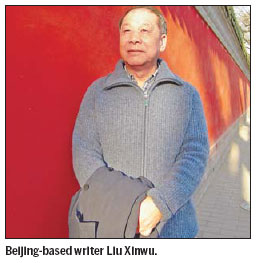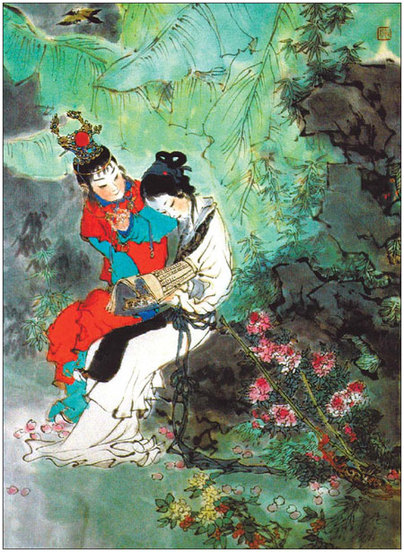Books
Completing the dream
Updated: 2011-03-30 07:52
By Mei Jia (China Daily)
|
A Chinese ink painting of Jia Baoyu and Lin Daiyu, by Dai Dunbang. Provided to China Daily |
An army of scholars has attempted to bring the destinies of the characters in Cao Xueqin's mid-18th century novel A Dream of Red Mansions, to a closure. Beijing-based Liu Xinwu is the latest to join the chorus. Mei Jia reports.
When it comes to rewriting literary texts, no example is more stirring than that of A Dream of Red Mansions, arguably the nation's best-loved read. Only the first 80 chapters of the mid-18th century novel by Cao Xueqin survive, with the characters' denouement hinted at but not spelt out.
When Beijing-based writer Liu Xinwu, 69, released his 28-chapter version of the ending in mid-March, it stirred up the proverbial hornet's nest.
Opinions were divided not only on Liu's qualification for the job, and the legitimacy of his version, but also on whether a new ending was really required.
Most scholars agree that it was Qing Dynasty (1644-1911) scholar Gao E who completed the novel with a 40-chapter ending.
Liu says his efforts are akin to putting the arms back on Venus de Milo: "The newest attempts shouldn't be dismissed simply because previous efforts have failed."
Liu is just the latest in a long list of writers who have attempted to provide an ending to the famous novel. The number of such works is estimated to exceed 100.
Varying in length, quality, and form, some make Gao's 120th chapter the starting point. Some recent versions have even gone so far as to experiment with Xue Baochai - Jia Baoyu's cousin who is the third angle to Jia and Lin Daiyu's relationship -speaking in English.
Referring to what he calls Gao's misleading inferences, Liu says he set out to restore Cao's original plans. "Cao intended to make it a tragedy," he says.
Basing his version on the notes of an army of early readers, Liu is confident about having Lin Daiyu drowned, Xue Baochai sick and depressed, Wang Xifeng, the nominal family head, humiliated and suicidal, and Jia Baoyu survive and return to his heavenly reincarnation as the Divine Attendant.
Liu's efforts have taken seven years and he says "writing in Cao's tone" posed the biggest problem. However, critics and writers such as Wei Minglun say his biggest challenge was replicating the poetry of the original.
 |
Liu scores his work as a six out of 10, a bare pass.
He says his efforts were not motivated by money and fame.
Born in Sichuan, Liu settled in Beijing in the 1950s, he established a name for himself in the 1970s with The Class Teacher, a novella seen as the start of the so-called scar literature in the wake of the "cultural revolution" (1966-1976).
He first started studying A Dream of Red Mansions, a childhood favorite read, in 1993. He came under the spotlight in 2005 when he gave lectures about the novel on CCTV.
He explained why he felt a relatively minor character, Qin Keqing, held the key to deciphering the novel's mysteries, and triggered a flurry of "Qin studies".
His conspiracy theory came under severe attack from other redologists, and this is also one of the reasons contributing to the current doubts about his new ending. "I want to call greater attention to Cao's 80 chapters," he says, "and hope my writing will become the trigger."
Cao is truly great to have created in Jia Baoyu a compassionate fighter against the dark side of society, Liu says. "Gao E has altered Jia's character but I have preserved it."
Specials

Sino-US Dialogue
China and the US hold the third round of the Strategic and Economic Dialogue from May 9-10 in Washington.

V-Day parade
A military parade marking the 66th anniversary of the Soviet victory over Nazi.

Revolutionary marriage
A newlywed couple sings revolutionary songs during their marriage.
